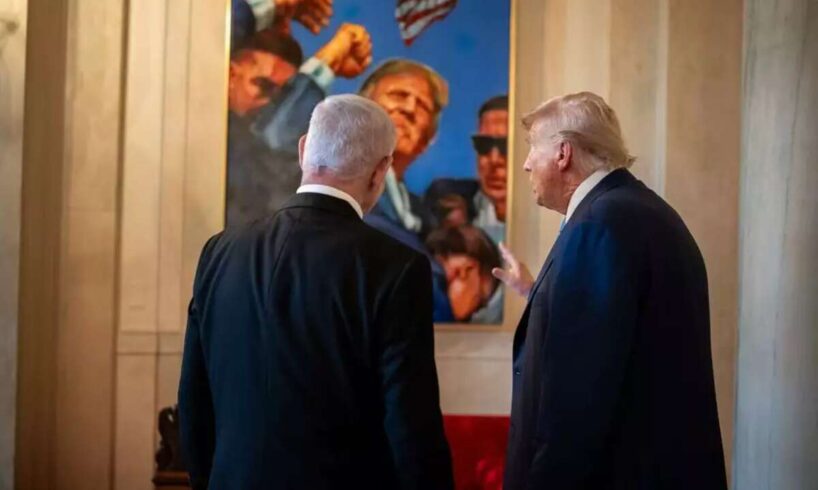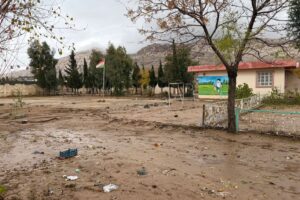
Paraphrasing the legendary line by the 19th-century strategic thinker Carl von Clausewitz, who argued that war should be the continuation of policy by other means, one could likewise say that a political arrangement, a deal, or even a ceasefire should emerge only after the guns fall silent. That is, provided we are not talking about what Clausewitz termed a “total war,” aimed at the unconditional destruction of the enemy without any thought to the day after.
In the reality Israel has lived in for nearly two years, it seems the pure, distilled logic of total war is what has guided the government’s recurring pattern since the bitter day of October 7. The latest expression of the fact that most Israeli decisions in this period have been driven by tactical-operational considerations, while completely ignoring an entire cluster of strategic-political constraints and needs, both regional and global, was the attempted assassination of the leadership of “Hamas abroad” in Doha.
Hamas offices in Qatar following the strike. Photo: Reuters Reuters
Just as the failed 1997 attempt to assassinate Khaled Mashal, who later headed Hamas’s political bureau, and in Jordan of all places, inflicted heavy diplomatic damage and deep embarrassment on Israel, particularly to the relationship of trust and intelligence-operational cooperation between the two countries, so too did the strike on Hamas leaders in Qatar intensify the diplomatic tsunami now threatening to return the state to the lowest point it has known since its founding.
In those distant days, when the Western powers, the US, Britain and France, turned a cold shoulder to Israel, while the inner ring of neighboring states encircled it with hostility, alienation and boycott, it was only Stalin’s Soviet Union that came to Israel’s aid with critical supplies of aircraft and oil. There is no disputing that this was a short and futile partnership that quickly faded into oblivion as Moscow’s support for the Arab camp grew.
Yet despite the 1997 fiasco, and in complete disregard of the critical political and strategic considerations that should have stood as a glaring warning sign before the eyes of then-prime minister Benjamin Netanyahu, last week the same picture repeated itself. The strategic and diplomatic arena was once again abandoned on the altar of a presumed tactical gain by that very same prime minister.
Devastating consequences
This time, however, the failure is far more serious, and its consequences could be devastating and systemic in scope. We are not talking about a sharp confrontation with the Hashemite Kingdom but about triggering a severe crisis with our only loyal ally and partner, the US. Not to mention the needless rift with the “complex” entity known as Qatar, with the Arab and Muslim world as a whole, with the entire international system, and with the worrying implications for the fate of the hostages.
First, remember that unlike Mashal, those in Doha whose lives were targeted were not living in the shadows or in hiding. They were acting openly on Qatari soil. Therefore, even if their time was limited and their blood was forfeit, what pushed Netanyahu to insist on taking them out precisely now, when the mediation process, with the US at its center, was still in full swing? What led him to think their successors would suddenly display moderation, a spirit of compromise and goodwill? Was Hassan Nasrallah, for example, any more moderate than his predecessor Abbas Musawi, who was eliminated in February 1992?
Airdrop of humanitarian aid over Gaza. Photo: AFP AFP
At bottom, if the aim was not to jolt the stuck ship and change its course, but rather to cut off any chance of reaching a deal and to continue waging “total war” even as its political, economic and social costs keep climbing and as the hostages’ lives are ebbing away before our eyes, one is left with the impression that even after decades of fighting Arab terrorism, our leaders have still not freed themselves from the conception that the balance of power between the sides is the sole key to absolute victory.
This is a simplistic, ethnocentric mindset that assumes even murderous, fanatical and radical movements are driven by a desire to minimize damage and survive. Did the lessons of the low-intensity conflicts of the 20th century, such as the Indochina War, the Vietnam War and the war in Afghanistan, not prove time and again that the weaker side does not necessarily seek a military victory, but rather aims to exhaust its enemy, bleed it, break its spirit and weaken its internal and external support base?
Do not forget: the American breaking point in Vietnam was anchored precisely in demonstrating the Vietcong’s willingness to engage in a kind of mass suicide by emerging from the darkness of the jungles into a frontal, hopeless clash with vastly superior American armor and forces. That was the turning point that showed decision-makers in President Johnson’s administration that their enemy’s operational code was fundamentally different from their own belief in the sanctity of life and the limits of risk that even terrorist and guerrilla organizations are prepared to take upon themselves.
An immediate need for statesmanship
Against this historical backdrop, it is also clear that the mantra of “absolute victory” is nothing more than a slogan. Continuing the strikes in Gaza will only accelerate the rapid erosion of our international standing, as everything painstakingly built since the state’s founding to broaden Israel’s circle of ties and partners shatters to pieces before our eyes.
Above all, the special fabric of relations between Washington and Jerusalem, which since the 1960s has provided Israel a robust safety net across every dimension, is coming undone. How can our leaders, so fixated on the tactical level, ignore Doha’s immense strategic and business importance in President Trump’s eyes, embarrass the president in the middle of negotiations his envoys are conducting with Israeli and Qatari representatives in the American capital, and not consult the White House before the strike?
US President Donald Trump, Qatari Prime Minister Mohammed bin Abdulrahman Al Thani, and Israeli Prime Minister Benjamin Netanyahu. Photo: AFP/Getty Images AFP/Getty Images
And how can they fail to consider that, with a single stroke, they would sever the Qatari mediation channel? With all its complexity, as Netanyahu himself put it, Qatar was the most connected state to every part of the Arab world. Why cut that channel, even temporarily? Is this not a death blow to the broader regional normalization vision that President Trump has pursued tirelessly?
And who, exactly, will replace Qatar as mediator? Will it be the prime minister of Fiji, who is expected to honor us with a visit this week? Finally, in light of all this, what image of Israel is likely to form among the nations, especially in our Middle Eastern neighborhood? Will it not erode Israel’s image as an anchor of stability and responsibility in a region riven by crises and fractures?
Amid this bleak and troubling picture, the UN’s decision the day before yesterday to approve by an overwhelming majority of 142 states the “New York Declaration,” which in essence constitutes a binding framework for implementing the “two-state solution” and explicitly supports the establishment of a sovereign Palestinian state while calling for an end to the fighting in Gaza, is a clear sign of the immediate need for genuine political thinking.
In a globalized world that Israel seeks to join in various frameworks as a legitimate, respected state, showing disdain for international institutions and organizations, in the spirit of the first prime minister David Ben-Gurion’s line “Um, shmum,” will only deepen Israel’s distress in every respect and could turn it into a kind of pariah state.





